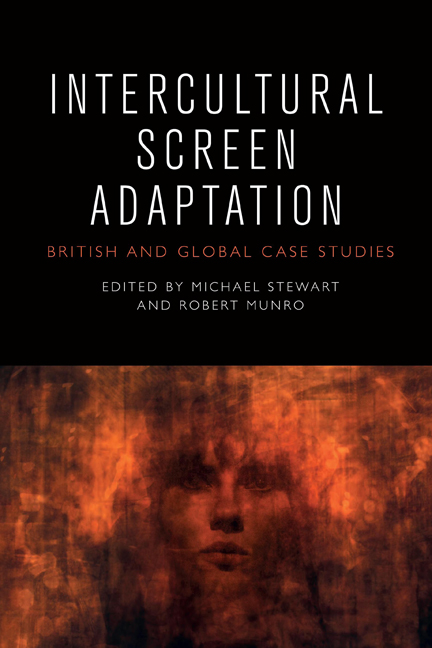Book contents
- Frontmatter
- Contents
- List of Illustrations
- Acknowledgements
- List of Contributors
- Introduction
- PART I NOSTALGIA, HERITAGE AND THE TOURIST GAZE
- 1 Adapting Pagnol and Provence
- 2 ‘A Tourist in Your Own Youth’: Spatialised Nostalgia in T2: Trainspotting
- 3 ‘200 Miles Outside London’: The Tourist Gaze of Far from the Madding Crowd
- PART II RADICAL CONTINGENCIES: NEGLECTED FIGURES AND TEXTS
- 4 Reframing Performance: The British New Wave on Stage and Screen
- 5 Why We Do Not Adapt Jean Rhys
- PART III RE-ENVISIONING THE NATIONAL IMAGINARY
- 6 ‘To see oursels as ithers see us’: Textual, Individual and National Other-selves in Under the Skin
- 7 Back to the Future: Recalcitrance and Fidelity in Julieta
- PART IV THE LOCAL, THE GLOBAL AND THE COSMOPOLITAN
- 8 El Patrón Del Mal: A National Adaptation and Narcos Precedent
- 9 Constructing Nationhood in a Transnational Context: BBC’s 2016 War and Peace
- 10 The Beautiful Lie: Radical Recalibration and Nationhood
- PART V REMAKING, TRANSLATING: DIALOGUES ACROSS BORDERS
- 11 In Another Time and Place: Translating Gothic Romance in The Handmaiden
- 12 Chains of Adaptation: From D’entre les morts to Vertigo, La Jetée and Twelve Monkeys
- 13 A ‘Double Take’ on the Nation(al) in the Dutch-Flemish Monolingual Film Remake
- Index
2 - ‘A Tourist in Your Own Youth’: Spatialised Nostalgia in T2: Trainspotting
Published online by Cambridge University Press: 22 September 2020
- Frontmatter
- Contents
- List of Illustrations
- Acknowledgements
- List of Contributors
- Introduction
- PART I NOSTALGIA, HERITAGE AND THE TOURIST GAZE
- 1 Adapting Pagnol and Provence
- 2 ‘A Tourist in Your Own Youth’: Spatialised Nostalgia in T2: Trainspotting
- 3 ‘200 Miles Outside London’: The Tourist Gaze of Far from the Madding Crowd
- PART II RADICAL CONTINGENCIES: NEGLECTED FIGURES AND TEXTS
- 4 Reframing Performance: The British New Wave on Stage and Screen
- 5 Why We Do Not Adapt Jean Rhys
- PART III RE-ENVISIONING THE NATIONAL IMAGINARY
- 6 ‘To see oursels as ithers see us’: Textual, Individual and National Other-selves in Under the Skin
- 7 Back to the Future: Recalcitrance and Fidelity in Julieta
- PART IV THE LOCAL, THE GLOBAL AND THE COSMOPOLITAN
- 8 El Patrón Del Mal: A National Adaptation and Narcos Precedent
- 9 Constructing Nationhood in a Transnational Context: BBC’s 2016 War and Peace
- 10 The Beautiful Lie: Radical Recalibration and Nationhood
- PART V REMAKING, TRANSLATING: DIALOGUES ACROSS BORDERS
- 11 In Another Time and Place: Translating Gothic Romance in The Handmaiden
- 12 Chains of Adaptation: From D’entre les morts to Vertigo, La Jetée and Twelve Monkeys
- 13 A ‘Double Take’ on the Nation(al) in the Dutch-Flemish Monolingual Film Remake
- Index
Summary
Ostensibly adapted from the novel Porno (2002), Danny Boyle's T2 Trainspotting (2017) was released 21 years after the 1996 cult classic original. Reviewers drew particular attention to the sequel aspect of the film: for Mark Kermode, the film is about ‘remembering the glory days of yore’ (Kermode 2017a). For Catherine Shoard, audience response to the film is symptomatic of a general nostalgic retreat from reality: ‘The reason for all that heady anticipation was not because we couldn't wait to see what the characters are doing now. It’s because we can't get enough of the past’ (Shoard 2017).
This chapter argues that T2 Trainspotting is a film suffused with nostalgia, for the lost youth of the protagonists, and for the original film. Actors, settings and set-pieces from the original are recreated, restaged and replayed. The film engages with nostalgia and memory in various ways, including recreations of iconography and dramatic spaces, the embodied nostalgia of ageing actors, and the replaying or simulation of archive materials to mimic and comment on the processes of memory. The sequel's debt to the original film also raises complex questions about adaptation and intertextuality against the increasingly global distribution of media texts. In its nostalgia for the previous film, T2 is not simply an adaptation of the novel Porno, but more complexly is an adaptation of the original Trainspotting film.
This chapter first sketches the social and historical context for ‘the Trainspotting cultural moment’ (Paget 1999) and the first film's cult status. It then outlines some aspects of adaptation theory and its application to Trainspotting, and discusses sequels and the compulsion to repeat with regard to T2. The chapter then focuses on spatialised nostalgia, the semiotics of space and T2's revisiting of key dramatic sites from the first film. It then discusses the ‘embodied nostalgia’ of ageing actors and the experiential gap between actors and audience. This leads to a discussion of the sequel's shift from the first film's depiction of the crisis of (Scottish) masculinity, to the flawed and absent fathers of the second film. Failed masculinity thus becomes a focus for nostalgia around lost families, and families that never were, in the second film. The chapter then discusses reflexive nostalgia, and the way T2 flaunts its nostalgic tendencies and mechanisms.
- Type
- Chapter
- Information
- Intercultural Screen AdaptationBritish and Global Case Studies, pp. 26 - 45Publisher: Edinburgh University PressPrint publication year: 2020



